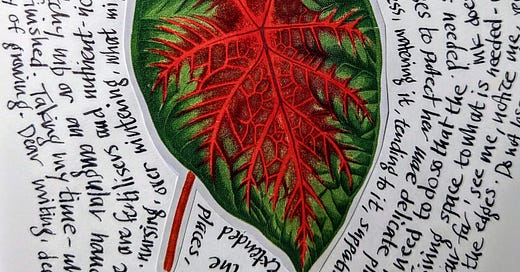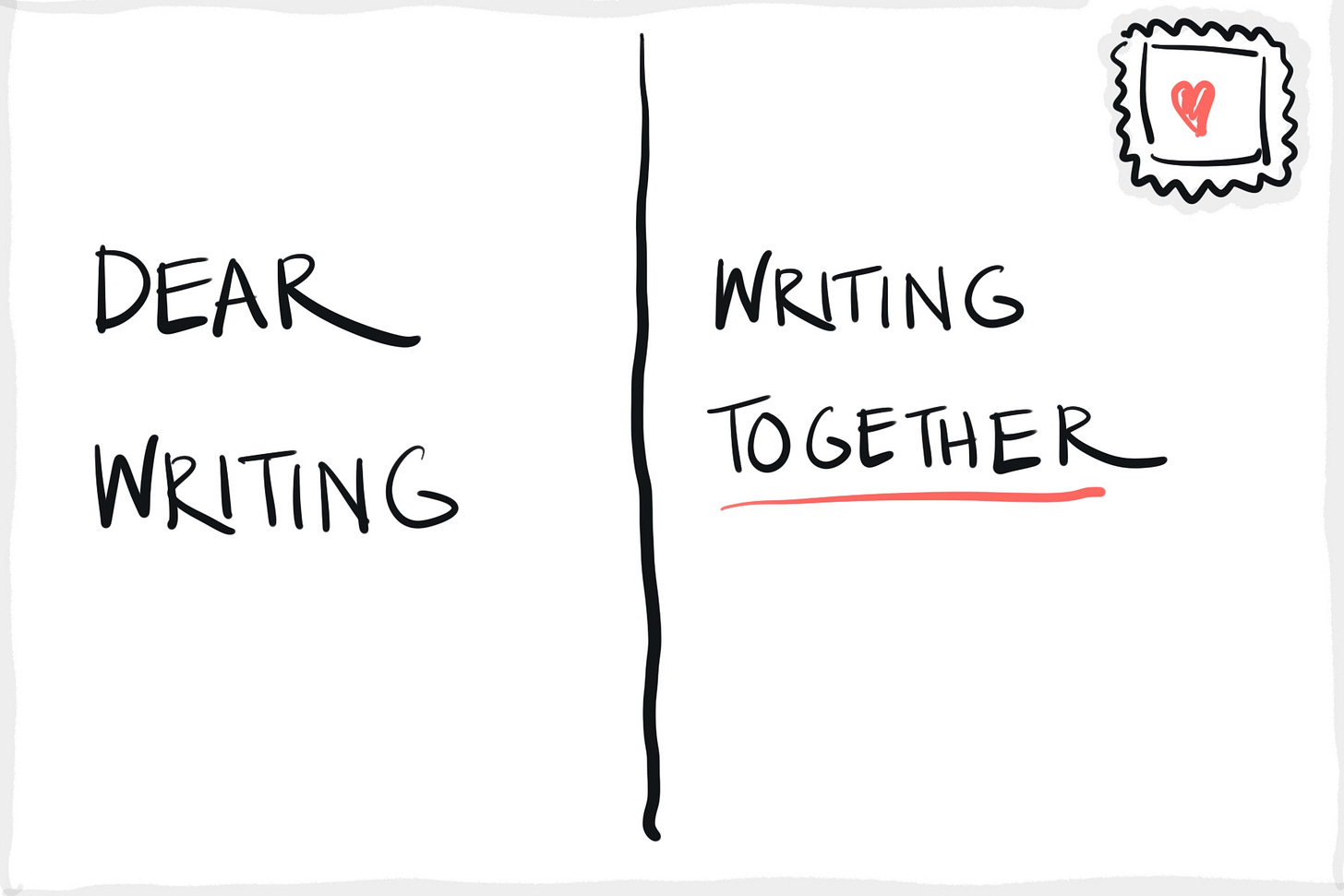Dear Writing friends,
A few weeks after my daughter was born, I was at a mother-and-baby get-together in a friend’s living room. For me, those early post-birth weeks are a blur of sleeplessness and painkillers but I remember a big, squashy sofa and a group of kind, supportive women, people I’d met through a pre-natal yoga class. Our babies were cradled in our laps or lying on play blankets on the floor.
At some point, one woman asked us if we had ‘written our birth story.’ The idea, she explained, was that you would write it all out, the story of the birth, because it was supposed to be helpful - piecing it all together, recording fragments that might otherwise be forgotten, talking about it with your partner or midwife, perhaps finding other perspectives.
There was a ripple of agreement around the room. One woman shared that she had made a special keepsake book, pasting in photographs, notes, her hospital bracelet to create a precious object that she could give to her son at some point in his future.
I sat silently on the sofa, my daughter curled into me. I wondered, as if I was observing myself through a glass screen, why the idea of writing anything at all about my daughter’s birth made my heart skitter and my mouth go dry.
After all, I was supposed to be a writer. My novel was, at that very moment, riding high in the bestseller charts. Before the birth of my baby, I’d been working as a therapist. My doctoral research, completed just a few years before, had suggested a model for writing and wellbeing in health care settings. I had worked with people who had survived terrible trauma. I knew some of the techniques and approaches that could be helpful. In fact, I had worked on developing some robust writing techniques for working with trauma myself. But even thinking about trying to write out my own very recent and raw experience flooded my body with terror.
I sat on that sofa feeling like a fraud. I looked down at my hands and saw that they were trembling as I gripped my daughter more tightly. My daughter began to whimper.
‘There, there,’ I said to her, stroking her hair. ‘There, there.’
More than eleven years have now passed since that afternoon on the sofa. Gradually, over time, I have been able to write small parts of ‘my birth story.’ I’ve talked about them with my own Mum, who was there with me, holding my hand, on the night that my daughter entered the world. I have talked about them with a therapist and with other people who have had traumatic experiences.
Every so often, I read a news article about women’s health care that sparks something in my body - rage or solidarity or overwhelming gratitude - and I go to my keyboard and start to tap out a few lines.
Sometimes this feels good and helpful. Sometimes, within moments, I am back there, sweating and shaking, reliving details from that time. It’s then, with my heart banging in my chest, that I know I have to stop writing.
There are some things I’m just not ready to write about. Not yet.
The field of writing and wellbeing is growing. I’m galvanised by the idea that something that has intrigued me for as long as I can remember - the connection between writing and both physical and mental health - is gathering momentum. It’s no longer the weird, niche, woo-woo thing that it was when I finished my PhD research in this subject.
OK. I’ll qualify that. For many people, it’s still decidedly woo and, as a field, we are still lacking a conceptual framework and a deeper understanding of the mechanisms by which writing can be helpful.
But ‘writing for wellness' and ‘writing for health’ is having ‘a moment.’ It’s happening everywhere. More and more of us are realising just how writing can help us. Writing things down can be powerful ‘medicine’. Sharing our stories with others, feeling witnessed or understood, can be life-changing.
And yet. And yet.
What I want to say is that it’s not always helpful to write it all out or revisit your pain.
Sometimes, that’s too much. Sometimes, when we’ve experienced deep trauma, writing about it might not be the best way forward. My personal belief, based on twenty-five years of working with people using writing, is that revisiting those feelings that we carry deep inside our bodies needs to be approached with caution and tenderness and lots of support.
I have worked with many people who have found it helpful and transformative to write - with the appropriate approach and help - about deeply traumatic experiences. And I have also worked with many people who have found that writing about painful things made them feel worse. Or at least, that it made them feel worse initially. Writing can be a solitary activity. I don’t believe that we should try to process such difficult feelings alone.
We are all different. It’s easy to be seduced by the idea of a nice one-size-fits-all, replicable set of writing techniques, the kind that can be tested in randomised controlled trials and handed out in hospital waiting rooms for particular problems or situations. So simple! So inexpensive!
But the reality is much more likely to be a nuanced and complex framework, within which we are supported to find the approaches that work best for the unique individuals that we are.
I am definitely not saying: don’t write about the big, difficult scary things in your life. There are tools to help people to do this. Over the past twenty-five years, I've been working on developing some of those tools myself.
But what I’m saying is: Please, please go gently. Be kind to yourself - which is something that doesn’t come easily to many of us. And if you feel that something is too painful to write about, please stop. Notice how you’re feeling. Please do not write yourself into despair.
Suggestions for writing about big, scary, difficult things
Ask yourself if you’re ready. As you write, notice how you’re feeling. Bring great curiosity and kindness to that act of noticing: How does this make me feel in my body? Is this OK? Approach the process as an experiment. If you were healing from a badly sprained ankle, you wouldn’t do hill sprints on it right away. You would take things slowly, build up your stamina gradually, testing for what holds. It’s normal for difficult things to hurt but it’s not OK to push through suffering. If writing feels too painful, stop and be kind and loving towards yourself for the rest of the day. Or experiment with 2.
Instead of writing about the big, difficult thing itself, write a letter to the tender, vulnerable part of yourself that is hurting about the big, difficult thing. Write about the feeling about the thing. Write as you would towards a dear friend or a small child. Use silly nicknames and special, soothing words. Lower the tone of your voice. Keep it soft and slow.
Experiment with creating a ‘holding space’ for the writing. Time can create a kind of holding: I will write for three minutes and then stop. A trusted person (friend or professional) who will hear and ‘hold’ your words with you can also help: Could I share my writing with you and talk through how it feels for me now?
Is there a kind, supportive reader - someone real or imagined who helps you to feel safe - that you can take with you when you visit that big, difficult thing in your mind? This could be a person you know or a character from a book or a film. It needs to be someone you can really get a sense of - how they move and speak, the sense of strength and protection that they can impart. Experiment gently with taking this person back with you into a scene or a moment. Write as if you were telling them the story of what happened. Imagine they are taking your hand in theirs or putting an arm around you.
Turn your big, difficult thing into a fictional story. Invent a character - a not-you - who does the big, scary thing. Throw in as many other supporting characters as you need. Change the setting. Change the narrative. Change the ending. Pick a genre: whodunnit, fairytale, romcom. Choose a form: screenplay for a TV drama, epic poem, how-to blog post. Be playful or silly or angry or authoritative or whatever it is that you need to be.
Dear Writing friend, please never feel that you have to make yourself write about the big, scary things. Practice being loving and patient towards yourself. This takes time. For most of us, it takes a lifetime.
Writing is a lifelong apprenticeship. I'm thankful for that.
Do you have any thoughts or questions about writing about scary and difficult things? I’d love to hear your reflections. Please do share in the Comments.
Next Writing Together sessions on Zoom
We spent a beautiful, supportive hour last night Writing Together on Zoom. Thank you to everyone who came along to create such a welcoming writing space.
If you missed it, remember that paid subscribers can catch-up with the recorded parts of the session. If you’d like to join our upcoming session in a couple of weeks’ time, you can subscribe at the button below.
Next dates:
Thu 16 Nov at 7pm GMT (** Two dates in November, due to my illness last month.)
Sat 9 Dec at 5pm GMT
Throughout the month of November, I’m participating in #AcWriMoments, a 30-day global writing adventure.
Subscribe to #AcWriMoments and every day, for the next 30 days, you’ll receive a gentle, expansive writing prompt. These 30 beautiful prompts have been created by writing scholars, coaches, consultants, and editors from around the world.
You don’t need to be an ‘academic writer’ to join in. In my opinion, these writing prompts, curated by
and , will be hugely helpful to anyone who wants to develop their writing. (#AcWriMoments is a gentle, supportive take on #AcWriMo, which is itself an adaptation of #NaNoWriMo.)I’m honoured to contribute a prompt to this stellar group of contributors and I’m also joining in with the adventure. See you in the #AcWriMoments Comments?
Wishing you all a week of kindness and supported writing. Thank you so much for being here with me. I appreciate so much that, in this world full of words, you choose to spend some time with mine.
Sophie x
P. S. Special thanks to my paid subscribers who make this free weekly letter possible by supporting my work. If you know someone who might find this Dear Writing letter helpful, please do share it with them or you could even give them a gift subscription. Thank you.










We are very appreciative of you, Hilary! 💜x
Thank you 🙏🏼 This speaks to me like a sweet salve at a perfect time: choosing the story 'spine' of a short film. Some of us feel truly, madly, deeply called to share our traumatic stories in public. We sense somebody somewhere needs the medicine of our specific healing journey. Still, my soul guided me to stop performing my one-woman show, which meant reliving a nightmare moment over and over... even though it led to massive transformation. Grateful for the nuance here.